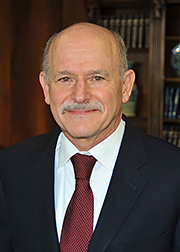 Steven B. Heymsfield
Steven B. HeymsfieldSteven B. Heymsfield Presents 2018 ARS W.O. Atwater Memorial Lecture
By Kim Kaplan
June 11, 2018
Boston, June 11, 2018—"From Measuring Rods and Calipers to Big Data: The Study of Human Body Composition Grows Up" was the title of Stephen B. Heymsfield's 2018 Agricultural Research Service (ARS) W. O. Atwater Memorial Lecture, delivered at the American Society for Nutrition’s annual meeting on Sunday, June 10, in Boston.
“Technological advances have afforded clinical nutrition investigators the opportunity to quantify body compartments with greater accuracy and depth than afforded by early pioneering efforts,” Heymsfield wrote in his abstract. “Paralleling other scientific fields, body composition measurement technologies are now generating vast amounts of digitally measured data and are promising to provide greatly improved knowledge of the human shape.”
Heymsfield is internationally renowned for his work on obesity, body composition and energy physiology. He pioneered the use of computed tomography ("CAT scans"), magnetic resonance imaging (MRI) and dual-energy X-ray absorptiometry to study skeletal muscle, fat and visceral organs.
Now, Heymsfield and his colleagues are advancing the use of 3D optical imaging, which uses the visible light spectrum—plus inferred and ultraviolet—in place of X-rays to assess body shape and composition, research that could transform the nutritional and health assessment of children and adults.
In addition, Heymsfield’s research and outspoken leadership on the health risks of an herbal weight-loss supplement were instrumental in the U.S. Food and Drug Administration banning its active ingredient ephedra in 2004. He was honored for his role with the 2004 NYC Mayor's Award for Science and Technology.
Among his other notable achievements are findings that helped overturn the convention that a 3,500-calorie deficit in the diet will lead to a one-pound weight loss and introducing the “four-compartment model” that is now the cornerstone reference method to measure body fat in people.
Heymsfield currently is Director of the Body Composition-Metabolism Laboratory at the Pennington Biomedical Research Center of the Louisiana State University System in Baton Rouge. He also is president-elect of The Obesity Society and a past-president of the American Society of Parenteral and Enteral Nutrition and the American Society for Clinical Nutrition.
The W.O. Atwater Lectureship was established in 1968 to honor the memory of Wilbur Olin Atwater (1844-1907) and to recognize scientists who have made unique contributions toward improving the diet and nutrition of people around the world. Considered the father of modern nutrition research and education, Atwater was the U.S. Department of Agriculture's (USDA) first chief of nutrition investigations.
For more information contact Kim Kaplan, ARS Office of Communications, or visit the W.O. Atwater Memorial Lecture web page.
The Agricultural Research Service is the U.S. Department of Agriculture's chief scientific in-house research agency. Daily, ARS focuses on solutions to agricultural problems affecting America. Each dollar invested in agricultural research results in $20 of economic impact.
